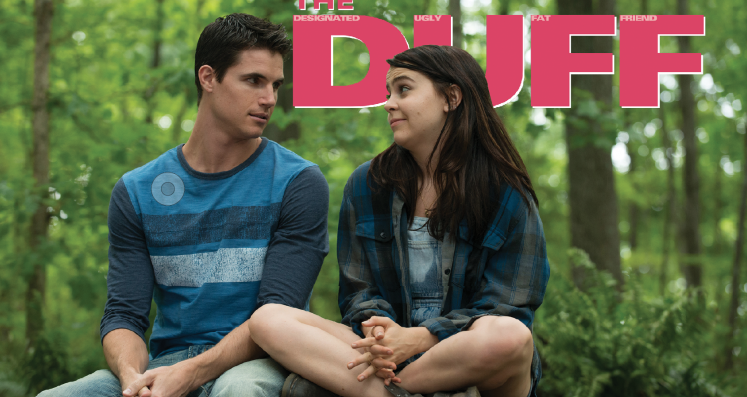An airhead of a film, “The DUFF” offers more fluff than actual substance, amounting to little more than a guilty-pleasure flick or a lazy diversion for undemanding teens.
In this unabashedly generic chick flick, high school senior Bianca (Mae Whitman) begins to question her role in the high school social hierarchy after her school’s resident jock heartthrob Wesley (Robbie Arnell) calls her the DUFF or “Designated Ugly Fat Friend” in her social circle. Enlisting Wesley’s aid, Bianca works to reinvent herself and shed her position as a DUFF, but unwittingly sparks a social revolution.
Unsurprisingly, “The DUFF” clings desperately to the predictable, overused romantic comedy formula that is consistently and boorishly slapped onto the big screen. Its clichéd romantic conflict and stereotypical characters fuel an underdeveloped plot that lazily glosses over interesting potential narrative facets and familial tension.
Additionally, “The DUFF” wavers dangerously between superficial and mawkish as it shifts roughly and gracelessly from crude humor to oversentimentality, causing seemingly evocative moments to appear tacky and hollow and making for extremely awkward tonal changes.
In addition, the movie makes cringeworthy, fruitless attempts to appear relevant to its target audience by unleashing a frenzy of witless pop culture references. Therefore, “The DUFF” obsessively tries too hard to be cool and fresh, ultimately sacrificing the quality of the plot and dialogue in order to do so. These foolish attempts, as well as the noisy and at times questionable special effects, distract from the movie’s narrative structure and detract from the film as a whole.
Regardless, the film boasts mildly funny dialogue, despite its overwhelming reliance on crude, slapstick humor. From time to time, a few particularly gut-busting zingers would induce eruptions of laughter among audience members, but these isolated few seemed to blend in with the rest of the oafish, tactless humor.
However, Mae Whitman, a likeable and adorkably charming lead, manages to master the pacing of her hysterical, snappy one-liners and makes the most of the limited plot and dialogue. Robbie Arnell also makes a valiant effort and manages to stand out, although to a lesser degree. Aside from Whitman’s vibrant performance, it is the strong chemistry oozing from between the two leads that serves as the film’s greatest asset.
The other cast members, on the other hand, merely fade into the background, offering static and forgettable performances. Their inclination towards inorganic overacting also contributes to morphing the film from emotional to manipulative, yet foolhardy.
Despite its strong leads and occasional successes in humor, “The DUFF” continues to suffer from its reliance on a shaky, formulaic plot. Forgettable, mediocre and unoriginal, this underwhelming “Mean Girls” wannabe offers mindless, yet carefree and filling entertainment.
My Conclusion: 4/10




























![Keep the New Gloves: Fighter Safety Is Non-Negotiable [opinion]](https://hilite.org/wp-content/uploads/2024/12/ufcglovescolumncover-1200x471.png)
















































![Review: “We Live in Time” leaves you wanting more [MUSE]](https://hilite.org/wp-content/uploads/2024/12/IMG_6358.jpg)
![Review: The premise of "Culinary Class Wars" is refreshingly unique and deserving of more attention [MUSE]](https://hilite.org/wp-content/uploads/2024/12/MUSE-class-wars-cover-2.png)
![Introducing: "The Muses Who Stole Christmas," a collection of reviews for you to follow through winter [MUSE]](https://hilite.org/wp-content/uploads/2024/12/winter-muse-4.gif)
![Review: "Meet Me Next Christmas" is a cheesy and predictable watch, but it was worth every minute [MUSE]](https://hilite.org/wp-content/uploads/2024/11/AAAAQVfRG2gwEuLhXTGm3856HuX2MTNs31Ok7fGgIVCoZbyeugVs1F4DZs-DgP0XadTDrnXHlbQo4DerjRXand9H1JKPM06cENmLl2RsINud2DMqIHzpXFS2n4zOkL3dr5m5i0nIVb3Cu3ataT_W2zGeDAJNd_E-1200x884.jpg)
![Review: "Gilmore Girls", the perfect fall show [MUSE]](https://hilite.org/wp-content/uploads/2024/11/gilmore-girls.png)
![Review in Print: Maripaz Villar brings a delightfully unique style to the world of WEBTOON [MUSE]](https://hilite.org/wp-content/uploads/2023/12/maripazcover-1200x960.jpg)
![Review: “The Sword of Kaigen” is a masterpiece [MUSE]](https://hilite.org/wp-content/uploads/2023/11/Screenshot-2023-11-26-201051.png)
![Review: Gateron Oil Kings, great linear switches, okay price [MUSE]](https://hilite.org/wp-content/uploads/2023/11/Screenshot-2023-11-26-200553.png)
![Review: “A Haunting in Venice” is a significant improvement from other Agatha Christie adaptations [MUSE]](https://hilite.org/wp-content/uploads/2023/11/e7ee2938a6d422669771bce6d8088521.jpg)
![Review: A Thanksgiving story from elementary school, still just as interesting [MUSE]](https://hilite.org/wp-content/uploads/2023/11/Screenshot-2023-11-26-195514-987x1200.png)
![Review: "When I Fly Towards You", cute, uplifting youth drama [MUSE]](https://hilite.org/wp-content/uploads/2023/09/When-I-Fly-Towards-You-Chinese-drama.png)
![Postcards from Muse: Hawaii Travel Diary [MUSE]](https://hilite.org/wp-content/uploads/2023/09/My-project-1-1200x1200.jpg)
![Review: "Ladybug & Cat Noir: The Movie," departure from original show [MUSE]](https://hilite.org/wp-content/uploads/2023/09/Ladybug__Cat_Noir_-_The_Movie_poster.jpg)
![Review in Print: "Hidden Love" is the cute, uplifting drama everyone needs [MUSE]](https://hilite.org/wp-content/uploads/2023/09/hiddenlovecover-e1693597208225-1030x1200.png)
![Review in Print: "Heartstopper" is the heartwarming queer romance we all need [MUSE]](https://hilite.org/wp-content/uploads/2023/08/museheartstoppercover-1200x654.png)




